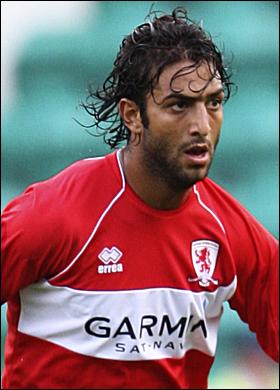By Mihir Bose
May 8 – Mido, the Egyptian player, has hired renowned London lawyers Mishcon de Reya to overturn a FIFA decision which effectively stops him playing for eight months.
This follows a refusal to sanction his loan from Middlesbrough to Egyptian champions Zamalek.
The case will be heard in Court of Arbitration for Sport (CAS), the highest judicial body in sport.
Originally, the case was meant to be heard this week before Geoff Thompson, chairman of the Players Status Committee acting as a single FIFA appointed judge in Zurich.
Mido’s lawyers had engaged top Queen’s Consul Michael Beloff, who presided over the cricket corruption case that saw three Pakistani players banned for spot fixing, to fly to Zurich.
But on Friday (May 6), Thompson, the former FA chairman and a member of the FIFA Executive Commitee, decided the case.
He ruled against Mido based on previous precedents and on what is obviously seen as a strict interpretation of the rules.
At 5 pm yesterday evening Mido’s lawers were informed that FIFA had come to this expedited decision against their client.
It this that has prompted Mido to go to CAS.
The case will highlight the consequences on football of the Arab Revolution and what Mido and his lawyers feel are very contradictory responses from FIFA to these political events.
The 28-year-old mercurial Egyptian has played in all the top European leagues and several English clubs starting with Tottenham Hotspur.
Since his permanent move to Middlesbrough in 2007 he has been on loan to both Wigan Athletic and West Ham United.
At the end of January Middlesbrough agreed a loan deal with Zamalek, the Cairo club where Mido began his career.
The restless Egyptian, who has played for his country 51 times scoring 20 goals, saw this as a prelude to a permanent move in a deal that could bring him £7 million ($11 million) over three years and also restart his international career.
Anticipating Mido’s arrival Zamalek loaned out their existing striker and Mido and his family moved to Egypt and even found schools in Cairo for his three children.
What Mido could not have calculated was the effect the Arab Spring would have on football and FIFA’s reaction to it.
Three days before the loan was agreed the Egyptian Revolution that removed President Mubarak from power started and the authorities closed all communications including phone lines and internet between January 28 and February 2.
The league was also suspended due to the lack of security.
It only resumed in the middle of last month with the season extended to the end of July.
The result was Zamalek could not log on to FIFA’s Transfer Matching System to complete the loan registration by the close of the transfer window on January 31.
Zamalek pleaded this was due to events beyond their control.
FIFA agreed that in these exceptional times Egyptian clubs needed a special transfer window and a four day one was created between April 8 to April 12.
Zamalek claims they submitted the necessary papers by April 9.
Initially Marco Villiger, FIFA’s director of legal affairs, denied a special window had been created.
Then he agreed there was one but said Zamalek had not submitted all the papers, the employment contract was missing.
He went on to advice that the player could wait until the next transfer window at the end of June.
With the season extended Mido would have to wait until the end of July and at 28 he feels a period of eight months of inactivity would do him little good.
He has already missed four matches.
It this anger that has made him appoint his own lawyers to fight FIFA and instructed them to go to CAS.

